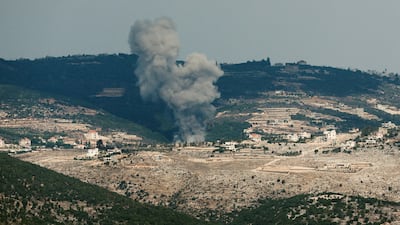Live updates: Follow the latest news on Israel-Gaza
Israel has struck the outskirts of Lebanon's Nabatieh region for the first time since the July 2006 war.
Two missiles launched from an Israeli drone hit an aluminium factory between the towns of Kfour and Toul, to the west of Nabatieh.
The bombardment resulted in a fire, destroying all its equipment. No casualties were reported.
Heavy Israeli shelling was reported on the southern border on Saturday morning.
The Israeli army targeted the outskirts of Marwahin with white phosphorus shells, Lebanon’s National News Agency reported.
The attack was one of the latest developments in the intensifying border conflict that has raged since October 8 between Israel and armed groups led by the Iran-backed Hezbollah, in support of its ally Hamas.
On Friday, Hezbollah conducted 13 operations against the Israeli army, marking one of the highest attack counts since the conflict started.
While the belligerents have showed some restraint in their attacks so far, with Hezbollah leader Hassan Nasrallah ruling out an immediate escalation, there are lingering fears that the slightest miscalculation could drag Lebanon into a full-blown war.
“The attacks carried out by Hezbollah are linked, firstly, to responding to the attacks carried out by the Zionist enemy or to supporting the Palestinian people in Gaza,” said Kassem Kassir, a Lebanese political analyst.
“We are careful to adhere to some rules so that these attacks do not lead to a large-scale war at this stage. This is due to Hezbollah’s political and field calculations, but this does not mean that matters are not likely to develop towards a comprehensive confrontation if necessary.
“Hezbollah has not revealed the extent of its military capabilities yet.”
'No room for discussion'
Heavy Israeli shelling was observed on the southern border throughout Saturday morning, with the National News Agency reporting that the Israeli army hit the outskirts of Marwahin using white phosphorus shells.
White phosphorus can legally be used against military targets, but its use against civilians is prohibited by Protocol III of the 1980 Convention on Certain Conventional Weapons.
Lebanese officials and human rights group have decried Israel's alleged use of the chemical against civilians, which, they say, have caused massive fires in the region.
Direct hits
Meanwhile, Hezbollah declared attacks on four Israeli targets, claiming to have achieved “direct hits”.
The morning violence follows a night of escalation, with Hezbollah announcing the destruction of an Israeli Hermes 450 combat drone with a surface-to-air missile at 1.45am on Saturday.
The Israeli army said it had intercepted a missile fired from Lebanon at an unmanned Israeli drone, Haaretz said.
“There is no room today for discussions around stopping any front or reducing pressure,” Hashem Safieddine, the head of Hezbollah's executive council, said on Saturday during a ceremony with party representatives.
“As long as there is a war against Gaza and a threat against its population and the killing of children and women, all honourable resistance forces in our region will continue to put pressure on the Israelis by all possible means,” he said.
The clashes have killed at least 88 people in Lebanon, mostly Hezbollah combatants as well as 10 civilians, according to an AFP tally
The situation is less clear from the Israeli side, as the Israeli army does not provide regular updates on injuries or deaths.
According to a written statement from the Israeli army to The National, at least eight soldiers have died since October 8.


